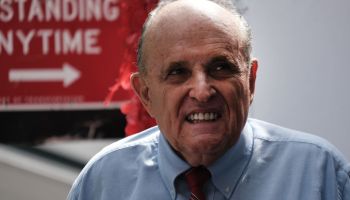LOS ANGELES (AP) — Prosecutors who depicted Michael Jackson’s doctor as remorseless for the superstar’s death urged a judge Wednesday to sentence him to four years in prison, while a defense lawyer said Dr. Conrad Murray is in a prison of self-punishment and should receive probation.
See also: Conrad Murray Given Alcohol, Tailored Suit and Van By Film Crew
The opposing sentencing memos were filed in advance of Dr. Conrad Murray’s sentencing hearing Tuesday. He has been in jail since he was convicted Nov. 7 of involuntary manslaughter for Jackson’s fatal overdose of the anesthetic propofol.
Prosecutors David Walgren and Deborah Brazil wrote that Murray has shown no remorse for Jackson’s death and has placed blame on others, including Jackson himself. They cited a series of post-trial media interviews with Murray that they submitted to Superior Court Judge Michael Pastor on a DVD.
In one excerpt, Murray states, “I don’t feel guilty because I did not do anything wrong.”
“Finally, the defendant consistently blames the victim for his own death,” said the prosecution brief, “even going so far as to characterize himself as being ‘entrapped’ by the victim and as someone who suffered a ‘betrayal’ at the hands of the victim.”
Defense attorney Nareg Gourjian, citing letters of praise from Murray’s former patients, said: “There is no question that the death of his patient, Mr. Jackson, was unintentional and an enormous tragedy for everyone affected. Dr. Murray has been described as a changed, grief-stricken man, who walks around under a pall of sadness since the loss of his patient, Mr. Jackson.”
Gourjian said Murray will never stop punishing himself over Jackson’s loss and, “In effect, he will be serving a form of life sentence. However, the offense was not willful nor intended. … He is, by every account, immensely sorrowful and remorseful.”
Murray was convicted after six weeks of testimony focusing on Murray’s administration of the drug propofol, an anesthetic not intended for treatment of insomnia or for home use. While Jackson was under the influence of the drug, Murray admitted leaving the room, prosecutors noted. They said he abandoned his patient when he was the most vulnerable.
In their memo, prosecutors said Murray “acted as an employee and as a drug dealer and completely corrupted the trust necessary in a proper doctor-patient relationship.”
Gourjian asked the judge to consider Murray’s humble beginnings in Trinidad and his lengthy career of doing good during his practice in Houston.
“The transgression for which he is to be judged should be viewed within the context of the larger life of which it is a part,” he said.
He also argued in his 45-page memo that current budgetary problems and overcrowding of prisons has made it necessary to release non-violent, non-dangerous offenders. “Dr. Murray is clearly such a defendant,” he said.
Gourjian noted that because of constant death threats, Murray must be kept in solitary confinement, which is expensive.
“Conrad Murray still has the knowledge, capacity and motivation to be a source of healing in the world,” Gourjian wrote. “Though he will perhaps not again be a doctor … he could educate and counsel patients about heart care and disease prevention.” He suggested that as a form of community service by the doctor.
Prosecutors attached to their motion a statement of monetary losses because of Jackson’s death exceeding $100 million. They suggested that “appropriate restitution” from Murray be ordered for Jackson’s children.
























